Intuitive Eating Q&A: Part 2

Intuitive eating can be a difficult process, especially in the beginning. There have been a few questions that came with clients recently that I want to address today. Read on for my answers and tips to help you during your intuitive eating journey.

I’ve been getting a lot of great questions over my Instagram page about Intuitive Eating. If you haven’t yet, you can also check out the other posts in this series: Intuitive Eating Q&A Part 1, Intuitive Eating Q&A Part 3, Intuitive Eating Q&A Part 4, and Intuitive Eating Q&A Part 5.
These questions and tips below cover weight loss, practicing intuitive eating with special health conditions and how to deal with guilt/shame. If you are new to Intuitive Eating, check out my blog post on how to get started. Stay tuned for more Q&A in the future and comment below with any questions you might have in your own Intuitive Eating journey.
I really thought Intuitive Eating would result in weight loss for me (even though I know that’s not the point!). I guess I’m still ever ‘hopeful’ that weight loss might just happen spontaneously, so I’ve been surprised that my weight is the same.
It’s totally understandable that you’re still hopeful for weight loss. Sadly, we live in a society that prizes smaller bodies and that makes it easier for those with smaller body’s to exist. Body and weight acceptance don’t happen overnight, and it isn’t easy, but it is totally possible. I think it’s first important to think about why you want to lose weight – get to the root of that. Continue asking “why?” until you get to the root. We have to know what our objections are with our body as it is right now before ever move forward with changing how we feel about it. A few other things to think about:
- Think about being a caregiver for your body instead of needing to accept your body.
- Think about actionable steps that show your body that you care for it.
- Can you instead tell your body, “I can show you some compassion and kindness”?
Behaviors towards your body change before thoughts/feelings towards your body. You can modify behaviors first, by taking actions towards caring for yourself. So, think about, “How can I be a caregiver to my body, hate it a little less, be less of a bully?” What are some ways this week that you can extend some self-compassion to yourself?
Can you explain why emphasizing Intuitive Eating should be a priority? Is it just for people’s mental health, or because there is an actual measurable health outcome?
Intuitive Eating is important for many reasons and there are definitely lots of measurable outcomes, including mental health benefits. Here are some of the science-backed benefits of Intuitive Eating:
- Higher HDL cholesterol levels
- Lower Triglyceride levels
- Lower rates of emotional eating
- Lower rates of disordered eating
- Higher self-esteem
- Better body image
- More satisfaction with life
- Optimism and well-being
- Proactive coping skills
Intuitive Eating is also important because of all the proven negative outcomes associated with dieting:
- Food and body preoccupation
- Repeated cycles of weight loss and regain (i.e. yo-yo dieting) which is linked to worse health outcomes
- Lower self-esteem
- Eating disorders
- Taking away from other health goals
- Weight stigmatization and discrimination, which leads to people in larger bodies avoiding doctors, getting fewer screenings and receiving worse medical treatment
And don’t forget these dieting/weight facts:
- 95% of diets fail; within 5 years 95% of people who lose weight will gain it all back (and two-thirds of those people will gain back more than they lost)
- Weight (and weight loss) does not equal health! Studies that link obesity to poor outcomes are based on correlation, not causation and what improves health is our behaviors, not our weight (behaviors is what Intuitive Eating focuses on)
So a weight focus not only doesn’t make us thinner or healthier, but it has many negative consequences. Meanwhile, Intuitive Eating has many positive health benefits both mentally and physically. This is why I choose to become and intuitive eating dietitian and practice from a weight-inclusive standpoint.
I work really well with structure and I am able to count calories without feeling restricted. I eat what I want but I give myself a limit. I tried intuitive eating once and I didn’t like how I felt! I didn’t trust myself and after a week I just felt guiltier than I did before. Is it possible to diet successfully?
Intuitive Eating takes time to fully work through. I always say it’s the opposite of a diet, where diets are easy at first – because you’re following structures and rules – and harder as time goes on; versus intuitive eating is really tough at the beginning but gets easier and easier until eventually, you don’t have to think about it at all. It sounds like the guilt and lack of trust made you feel uncomfortable. This feeling is completely normal when adding back in a wider variety of foods that you don’t regularly eat. It is normal for it to feel wrong to eat all foods, when you’re used to thinking of certain foods as good or bad (even if that’s subconscious) or used to thinking about things in terms of calories.
Instead of running away from that uncomfortable feeling, and turning back to the “safe” and “comfortable” behaviors that you know, you have to be ok it being there and feeling this way for a little while. The length of time varies but usually takes at least a month or two, and often longer. Eventually, the uncomfortableness is replaced with a strong connection to your intuition and with that will come feelings of ease and relief, and no guilt. Eventually, you will not have to overthink your food decisions, it will come naturally and easily.[br]
Check out the other posts in the Q&A series:
Intuitive Eating Q&A Part 1
Intuitive Eating Q&A Part 3
Intuitive Eating Q&A Part 4
Intuitive Eating Q&A Part 5
What other questions do you have about Intuitive Eating? Share in the comments below and I’ll answer them in future blog posts!
Looking for more intuitive eating support?
Check out my Unapologetic Eating 101 Course, an online, self-paced program to liberate yourself from dieting and make peace with food and your body.
My team and I also offer virtual one-on-one support – you can check out our virtual intuitive eating nutrition coaching packages.
My book, Unapologetic Eating: Make Peace with Food and Transform Your Life, is also a great resource that includes information, research, and reflection prompts to help you move away from dieting and come back home to your body, so you can live your most unapologetic, liberated life.
Author Bio
This article was written and reviewed by Alissa Rumsey, MS, RD, CSCS, a registered dietitian and Certified Intuitive Eating Counselor. She specializes in weight-inclusive care, intuitive eating, body image healing, mindfulness, self-compassion, and healing from chronic dieting, disordered eating, and eating disorders. Alissa holds a Bachelor’s Degree in Nutrition and Exercise Science, and a Master’s Degree in Health Communications, and is also an NSCA Certified Strength and Conditioning Specialist.
8 Comments
Leave a Comment
share the love
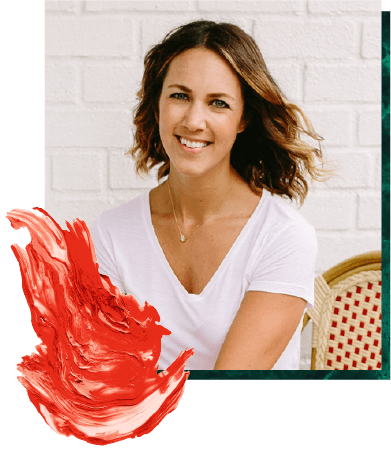
about
Alissa Rumsey, RD.
Alissa Rumsey, MS, RD, CDN, CSCS (pronouns she/her/hers) is a registered
dietitian, nutrition therapist, certified intuitive eating counselor, and the author of
Unapologetic Eating: Make Peace With Food and Transform Your Life. Alissa is
passionate about helping people reclaim the space to eat and live,
unapologetically.
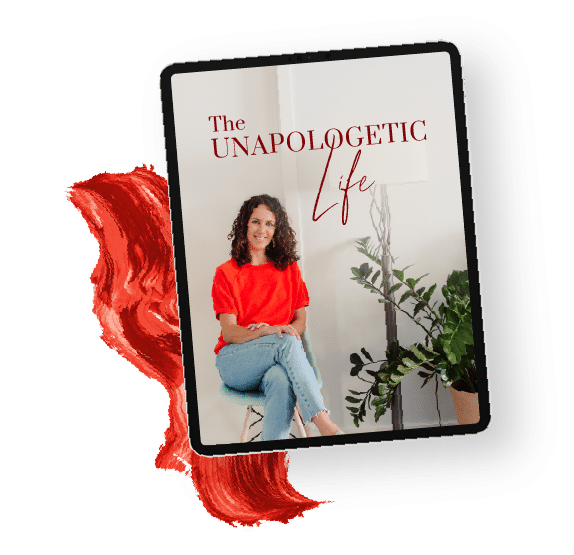
A twice-a-month round-up of inspirational stories, lessons, practical tips and encouragement for living your most authentic, unapologetic life.
The Unapologetic Life
RECENT POSTS
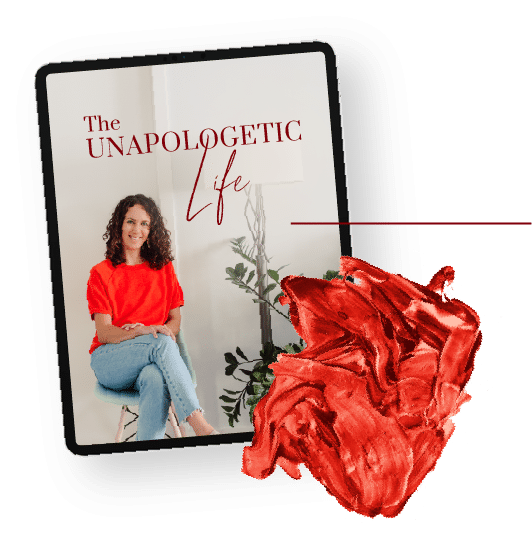
The Unapologetic Life
A twice-a-month round-up of inspirational stories, lessons, practical tips and encouragement for living your most authentic, unapologetic life.






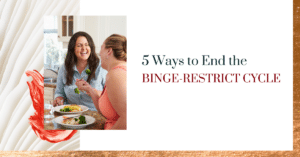
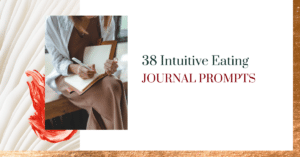
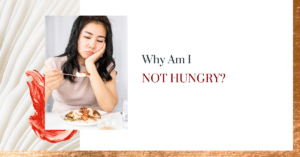
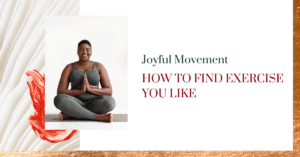
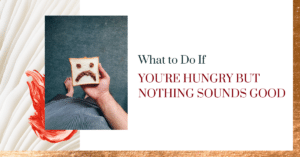
When I was younger I was overweight and I was overeating. I think I got to a point later on when I was practicing intuitive eating, and my weight became lower at this point. Lately, I’ve found myself in a more restrictive mentality and working to return to intuitive eating. My question is, if I return to intuitive eating, am I going to be overweight like I was when I was overeating? Because I didn’t feel good then either.
Hi Julie, it’s impossible to say what will happen to your weight – we really have very little control over it. Our body has a natural set point range of 10-20lbs that it works to keep us in. As you work on intuitive eating, some people find they initial gain some weight or lose some weight, but either way your body will eventually return to its natural set point, whatever that may be.
Hello,
I have been into eating everthing I want for four months now and I can feel the benefits of being more relaxed, less overeating and no more guilt or shame around food. But I noticed that my skin, which has always made me some worry, has become a bit worse during those months. I couldnt find anything about intuitive eating and skinhealth online or anywhere and would love to know more about it. Can my skin handle all the sugar and pizza and fries?
Would love to hear from you and be very grateful for more information and insights on this topic.
Lots of love,
Norina
Hi Norina, that’s wonderful to hear that you are feeling so much better!! I love hearing this so thank you for sharing 🙂 Re: skin – diet can sometimes play a role for people, and this could be a place to insert some gentle nutrition, but only when you’re ready. If you use nutrition too early, it can become like a diet. In the meantime, I’d just keep an eye on your skin and see what you notice. Once you feel like you’re in a more solid place with IE and have made peace with food, are reframing the food police, are honoring your hunger, feeling your fullness, and have rejected diet mentality – then you could start using some gentle nutrition in regards to your skin. Here are a few posts on that topic: https://www.rachaelhartleynutrition.com/blog/how-to-practice-gentle-nutrition-in-intuitive-eating, http://victoriayatesnutrition.com/are-you-ready-for-gentle-nutrition/ and https://www.thereallife-rd.com/2018/07/gentle-nutrition/
Hi, I have recently begun trying intuitive eating and am a little confused about the ‘making peace with food’ stage. Should I be eating previously forbidden foods past fullness at this stage, and only be considering fullness once I have truly made peace with food? Or should I be eating forbidden foods, but only to saiety? Thank you!
Hi Jessica, great question! The main thing in this stage is to give yourself unconditional permission to eat – creating an environment where you can eat previously off-limits foods when you want to. If you shoot past fullness that is fine – think of each eating experience as a learning experience. Approach it with curiosity, instead of judgment. Let me know if this answers your question!
Hi! I have been working on intuitive eating these past few months. I was really underweight and worked with a dietitian to go to a healthy weight, but still had a restrictive mentality (also don’t have my periods for 2 years). It is really hard for me to be intuitive, as I don’t really feel “hungry” or don’t wait until then and eat really quickly when meal time comes. Is my body at one point start to be more mindful and take time to eat, or is it something that I have to force myself to practice? I often eat past fullness the foods that I do not really like and feel like I am always bingeing.
Hi Ema, if you had restricted your eating in the past it’s possible that your hunger and fullness cues could have atrophied. For this reason, it’s important to eat consistent meals throughout the day, even if you aren’t feeling a physical hunger cue. I’d definitely recommend working with a dietitian, feel free to check out our services or you can also find more here: https://www.intuitiveeating.org/certified-counselors/